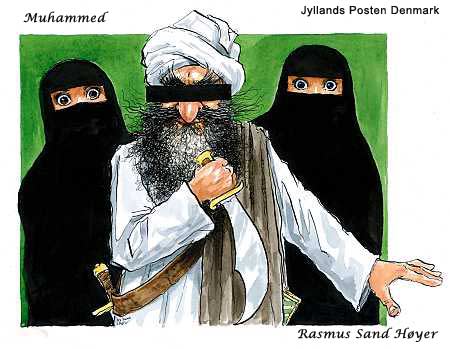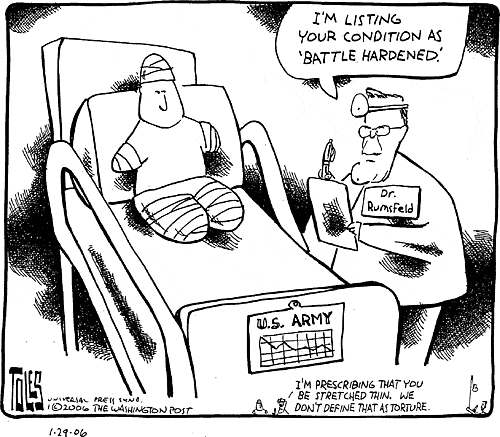What do spam, Islamists, porn, Cindy Sheehan, and cartoons have in common? Free speech. It’s everywhere these days, a constant din. We need to figure out what’s free and what’s just speech before we go deaf.
In the high and far off times, when the Founding Dads were mulling over the liberties essential to the life of a free society, free speech was front and center. They were talking about free political speech, which explains points of view or criticizes them. I doubt there’s any dispute that the free flow of ideas is essential to democracy. People may not feel that democracy is necessary, but if you do want democracy, you can’t have it without free political speech.
So far, so good, but talking to yourself in a closed room isn’t really the point. The free *flow* of ideas means people need to hear as well as speak. That leads to radical conclusion #1: Broadcast information is an important method of delivering ideas, so free airtime has to be available to air different points of view. The time needs to be taxpayer-funded *at cost* because the free flow of ideas is the lifeblood of democracy. I know the broadcast giants would have foaming fits if the public actually had some use of the public airwaves. That’s just too bad.
Illegal takeovers of the kind that have gutted traditional broadcasting are not limited to old media. There is the issue of “pipes” and the internet. In the US, the government and a few large companies own major portions of the backbone, the “pipes,” that allow the broadband internet to function. Some of those companies have started making noises about how they’re going to promote their own “products” on “their” pipes, and start charging others more for the use of the network.
The internet was started by the government, carried forward by the free contributions of countless academics and others, and the basic fiber optic cables were laid down with taxpayer money. The companies who now have responsibility for running parts of these networks received all that immense value for free. The companies need to pay back all that value first, if they think the internet shouldn’t be free. (More on these issues by Christopher Stern at WaPo, Jeffrey Benner at Salon.com, and on “content-based billing” by Feliks Welfeld at CommsDesign.com. Remember, the companies are NOT the ones generating the content. They just want to charge for it, apparently simply because they think they can.)
The whole idea of charging for the network is as antisocial and counterproductive as charging everyone to set foot on the road. The net is a social good and a natural monopoly, like highways. Like them, it needs to be recognized as such, and to be regulated and freely available the same way.
Tangentially, another natural monopoly and essential utility of the internet is the ability to search it. That, too, needs to be freely available and regulated for the good of all. (Yes, Google, I’m looking at you.) Bill Thompson has some more thoughts on that subject.
Religious or philosophical expression is another cornerstone of free speech, and not one subject to much controversy. Without that freedom, the central quest of finding our own place in the universe becomes crippled. The whole point of a free society is that the only limits are not harming others, and it certainly covers the freedom to search for our God in our own way.
Here again, the need to be heard is important, so nobody can have a much bigger megaphone than anyone else. That’s the idea behind insisting that government cannot promote any given religion. If it does, other religions quickly become suppressed mutterings in small rooms. People may not want free societies, but if they do, then separation of church and state is essential to the freedom of religion. Lately, this seems to be turning back into a new concept.
That was the easy part. Now comes the hard part. Cartoons. They’ve been much in the news lately. A Danish newspaper published a series of cartoons depicting Mohammed in the context of a discussion about free speech and whether it was right that Muslims tried to insist that everyone, not just other Muslims, had to refrain from showing images of the Prophet. Four months went by. Nobody really noticed. The Hajj, the annual pilgrimage to Mecca by millions of Muslims took place. Once again, there was insufficient planning and organization with the result that several hundred people were trampled to death. This is not the first time that’s happened. There were rumblings that the Saudi government should “do something.” The Saudis started the storm about some four month-old cartoons. (Insight into this affair from the incomparable Religious Policeman, and other posts earlier and later.)
That’s the background on that particular controversy, but there is a real issue at its heart. Is respect for other people’s viewpoints more or less important than free speech? The way I would answer that question is by taking both choices to their potential conclusions. If respect is more important, then any speech that offends someone has to be silenced. If applied to everyone, nobody would have any free speech. On the other hand, if free speech is more important, then some people would have to avert their eyes to avoid offense. So long as they are able to do that, giving free speech priority enables everyone to live according to their own lights.
In the interests of following that principle myself: note that a copy of one of the cartoons appears below. It says it all, as far as I’m concerned. A link to all twelve of the famous cartoons: The Shadow of the Olive Tree . [Update 2013-03-31. A cursory search indicates that the cartoons have been removed at news sites. The only copies I could find are on the Wayback Machine.]

Then there’s Tom Toles’ cartoon that offended the Joint Chiefs of Staff so much. “Beyond tasteless” said the top military brass.

The cartoon is a real avert-your-eyes piece of work, but not because of Tom Toles. What’s tasteless is a useless war that destroys people, and a country that hardly takes care of the vets afterward. The cartoon points that out. Starkly. The cartoon would be tasteless if Toles thought that was funny. He’s outraged. What’s tasteless is worrying about a cartoon rather than sharing the outrage. This is such an obvious example of free speech being used to air criticism that I’m not sure why the Joint Chiefs, who are presumably in the business of defending those freedoms with their lives, need to have this explained to them. If they don’t like the cartoon, they have it in their hands to make it irrelevant.
Moving right along to the other burning question: t-shirts. In the days when clothes were clothes, you had to carry a placard to make a point. Now, through the miracles of modern technology, we can print slogans on t-shirts and bill caps, which enables Cindy Sheehan and a congressman’s wife to appear at the State of the Union speech wearing t-shirts that support the troops, each in her own way. How far do you take the outlawing of meaningful clothing? If words or numbers are forbidden, how about pictures? One could wear a shirt printed with Picasso’s Guernica painting. Is it art or is it a Statement, and who gets to decide? If a near-Muslim aversion to any representational imagery is enforced, will pink triangles become illegal because they make a statement about gays? How about just the color pink, if triangles are deemed too obvious?
You see where I’m going with this. It wouldn’t take much to end in rules that require everyone to wear identical clothing in sober shades of gray. This is ridiculous. I can understand that on decorous occasions one doesn’t want the visual landscape cluttered with people’s personal billboards. And I can also understand that potentially offensive sexual or religious messages are deprecated, because there is no way to avert your eyes when someone is in your face with their clothing. But editing political statements on people’s clothing during a political occasion is absurd. It’s nothing but shouting down the opposition, and that is suppression of free speech.
What about those other wellsprings of offensiveness, porn and spam? Let’s take them in order. The idea behind free speech is that some of it is essential to a free society, and the rest of it is nobody’s business but your own. If porn had no effects beyond the consumer of it, there would be nothing to regulate. However, porn does have demonstrable effects on people’s minds. If it didn’t, we wouldn’t be so worried about children seeing it. It is an infection of the imagination that may or may not cause harmful consequences to others. Whatever else it is, it is definitely not a social good. It’s as gray an area as you could ever hope to find.
That leads to Radical Conclusion #2. Porn as a voluntary, private matter shouldn’t be regulated. It should be invisible to those of us who don’t want to see it, but to those who do, it’s their business. Achieving that would mean separate Internet domains, changes to magazine cover art, and so on through more sad examples than I have space for.
There is, however, another aspect to porn, the aspect of infecting imagination and the addictiveness of it for some people. Most people’s imaginations don’t reach all that far, but broadcasting the slickest, extremest fantasies of a few gives everyone access to the drug in its stronger forms. I think it is a real mistake to allow that. People should be limited to their own imaginations, and the way to do that would be Radical Conclusion #2a: allow non-commercial porn, but not any other kind. Actors, producers, distributors, in short, everyone involved would have to be working for free, purely because they liked what they were doing so much. Nor could they sell advertising or make ads.
[Update 2013-03-31. The amount I know about porn could, obviously, fit on a postage stamp. It has since come to my attention, e.g. 1, 2, that some of the most damaging porn is non-commercial. (A search for “rapes posted online” gave well over ten million results when I tried it today.) So forget the non-commercial distinction. The only real distinction is between harmful versus harmless. And porn has disappeared so far down the sewer that it’s not even called porn if nobody is degraded, humiliated, or damaged.]
(I’m purposely avoiding the whole question of art versus pornography. They’re easy to distinguish at the extremes, impossible in the middle. Where to draw the dividing line is a matter of taste, and doesn’t really affect the main argument that volunteer pornography harmless erotica shouldn’t be regulated, except to enable people to avoid it. So much art is produced for a pittance that it would probably fall under that umbrella in any case.)
Hate speech is another form of offensiveness with a big gray area where it shades into political or religious speech. There is one simple distinction that can be made, following the same principle that makes it illegal to yell “Fire!” in a crowded theater. Speech that advocates harm to others is increasingly being considered illegal hate speech in many countries. This is not a radical conclusion. What is radical is the idea that we should apply that measure to entertainment as well. Advocating harm against a person because of their membership in a group is not entertainment. It’s illegal hate speech. For instance, it is not okay to put women through meat grinders any more than it is to lynch blacks, whether it’s for politics, or for religion, or, God help us, for “entertainment.”
Finally, we get back to an easy one: spam. The justification behind spam is something called “commercial free speech.” In plain English, that says that if I have something to sell, I can say as much as I want about it. The idea behind political free speech has been applied to something totally different. It’s as if someone said, “Salt is essential to life. Therefore I’ll pickle you in salt.”
The idea behind free speech–one more time–is the free flow of ideas. Not the free flow of dollars. There is no such thing as commercial free speech. Speech that is not about ideas, but is about making a buck, does not need protection for the good of a free society, and, in fact, cannot have protection for the good of a free society. That’s why we have truth in advertising laws. Radical conclusion #3: We need to get our heads around the fact that telemarketers, spammers, junk mailers, and the whole boiling of pestiferous blots on the body politic are not exercising free speech. They’re trying to sell us stuff. One citizen is not normally allowed to harass another. That comes under the definition of causing harm. So when will some brave politician finally point out that all this garbage is nothing less than harassment and it has to stop?
Interestingly enough, the other side of “commercial” free speech doesn’t get much respect. Individuals who complain about their experiences with a company are being sued for slander or annoyance or who-knows-what-all. The principle in operation seems to be that if you’re a company it’s free speech, not harassment, but if you’re just a wee little individual spending your own time and money, then it’s the other way around. Before this complete travesty gets any further out of hand, individuals’ rights to discuss their experiences on an unpaid, uncompensated basis must be totally protected.
So . . . where are we now? The short form is this: Speech that’s a drug or an amusement or is trying to make a buck is fine so long as it’s not in anyone’s face. Don’t ask. Don’t tell. But speech about ideas, any ideas, that does not advocate hate crimes, should and must be free. Without that, there can be no free society.
Update, March 1, 2006:
Turns out, I’m fiddling at the feet of giants. They’ve weighed in on the cartoon controversy much better than I can. From the BBC report on Writers issue cartoon row warning.
Signed by:
Salman Rushdie – Indian-born British writer with fatwa issued ordering his execution for The Satanic Verses
Ayaan Hirsi Ali – Somali-born Dutch MP [see next post, and link also in link list]
Taslima Nasreen – exiled Bangladeshi writer, with fatwa issued ordering her execution
Bernard-Henri Levy – French philosopher
Chahla Chafiq – Iranian writer exiled in France
Caroline Fourest – French writer
Irshad Manji – Ugandan refugee and writer living in Canada [link]
Mehdi Mozaffari – Iranian academic exiled in Denmark
Maryam Namazie – Iranian writer living in Britain
Antoine Sfeir – director of French review examining Middle East
Ibn Warraq – US academic of Indian/Pakistani origin
Philippe Val – director of Charlie Hebdo
“We, writers, journalists, intellectuals, call for resistance to religious totalitarianism and for the promotion of freedom, equal opportunity and secular values for all.”
“It is not a clash of civilisations nor an antagonism of West and East that we are witnessing, but a global struggle that confronts democrats and theocrats.”
“Islamism is a reactionary ideology which kills equality, freedom and secularism wherever it is present,” the writers added, saying it is nurtured by fears and frustrations.
Not just Islamism, I would add. All totalitarian fundamentalisms–Christian, Hindu, all of them–bring ignorance, war, and death in the name of some god made in their own image and likeness.
Technorati tags: free speech, cartoons, Danish cartoons, cartoons of Mohammed, hate speech, protests, regulation
 Print This Post
Print This Post
 Print This Post
Print This Post






